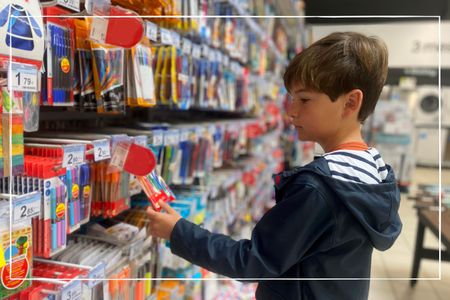How much pocket money should you give? £8.35 is the going rate according to new data, and boys earn more up until this age
New research has revealed the average weekly pocket money a child receives by age, and there's some interesting findings when it comes to gender

Kids earned more than £274m in 2023, according to new data, with the average child now getting £8.35 per week in pocket money.
After weighing up the pros and cons of pocket money, not all parents decide to give it to their children, but those who do are paying close to £10 per week per child. That's according to new research from GoHenry, the prepaid debit card and financial education app for kids aged 6-18. If you want to move away from giving your children cash and use an app instead, we've rounded up the best pocket money apps to help you choose.
The new data, which is based on a sample of 739,660 active GoHenry members throughout the majority of 2023, shows that average pocket money values varies from £3.33 for six year olds, peaking at £15.78 for 15 year olds, then dropping slightly to £13.01 for 18 year olds.
Average pocket money payments by age
The GoHenry data breaks down the average pocket money value by age, showing that the average six-year-old gets £3.33 per week, rising to £6.67 by age 11, and peaking at £15.78 for 16-year-olds.
- Age 6 - £3.33
- Age 7 - £3.47
- Age 8 - £3.81
- Age 9 - £4.29
- Age 10 - £5.14
- Age 11 - £6.67
- Age 12 - £8.77
- Age 13 - £11.08
- Age 14 - £13.17
- Age 15 - £14.84
- Age 16 - £15.78
- Age 17 - £14.96
- Age 18 - £13.01
However, when the stats are broken down by gender, as shown in the table below, they show that up until the age of 10, on average boys get more pocket money than girls, but from age 11 to 17, girls get more. While the amount of pocket money a child gets tapers off after they turn 16, when they might be starting to earn some money through part-time work, when kids turn 18, boys tend to receive slightly more than girls (£13.17 versus £12.83).
| Row 0 - Cell 0 | Weekly average pocket money payments for boys | Weekly average pocket money payments for girls |
| Age 6 | £3.34 | £3.33 |
| Age 7 | £3.56 | £3.35 |
| Age 8 | £3.97 | £3.63 |
| Age 9 | £4.46 | £4.11 |
| Age 10 | £5.24 | £5.05 |
| Age 11 | £6.47 | £6.86 |
| Age 12 | £8.40 | £9.13 |
| Age 13 | £10.69 | £11.45 |
| Age 14 | £12.88 | £13.44 |
| Age 15 | £14.55 | £15.15 |
| Age 16 | £15.43 | £16.14 |
| Age 17 | £14.71 | £15.24 |
| Age 18 | £13.17 | £12.83 |
According to Go Henry's data, the most popular tasks that warranted pocket money payments were doing homework, reading everyday, feeding pets, making the bed or tidying their bedroom. But while this approach may work for some parents to help them incentivise their kids to help around the house, for others, those tasks aren't pocket money worthy. GoodtoKnow's Family Editor Stephanie Lowe says: "I want my son to understand money and earning it, but I also don't want to 'pay' him for things around the house that I want him to grow up doing because that's part of being a family. When he's old enough, mowing the grass could be a 'paid for' thing but making his bed, tidying his room, setting the table are family expectations."
Mum-of-two Emily, gives her nine-year-old twins £3 per week, to spend on what they'd like rather than as payment for chores around the house, saying: "I give the boys the same amount each week, just to help them start to learn about the value of money. My husband and I obviously still buy them everything they need, but if we're out and about and they want a toy or a magazine or some sweets, then they have to use their pocket money, and if they don't have enough, then they have to wait until they do."
How much pocket money should you give a child?
The amount of pocket money you give a child will likely depend on their age and your own family budget. But as Louise Hill, co-founder and CEO of GoHenry says, the act of giving pocket money can have real benefits for your child, regardless of the value: "The amount you give - whether 10p or £10 - isn't what matters; it's the act of regularly providing pocket money that's important. It encourages conversations about finances at home and helps children think about the four key pillars of managing their own money: saving, spending, earning responsibly and giving. Giving kids pocket money helps them understand where money comes from, the importance of saving, the concept of budgeting, and the value of donating to those in need.
GoodtoKnow Newsletter
Parenting advice, hot topics, best buys and family finance tips delivered straight to your inbox.
"Pocket money is particularly useful when kids might ask you to buy them something which is out of your budget - or something you don’t feel is worth the spend. Instead of saying no, you can help them earn some extra pocket money (e.g. by doing extra chores around the house or washing the car) so they can save towards it themselves."
Whether or not you choose to give your child pocket money, it's worthwhile knowing the important money lessons all parents should teach their kids, the money games for kids that can help. If you have a teen, it might also be useful to explain the safe ways teens can start earning their own money.
Sarah is GoodtoKnow’s Money Editor. After Sarah graduated from University of Wales, Aberystwyth, with a degree in English and Creative Writing, she entered the world of publishing in 2007, working as a writer and digital editor on a range of titles including Real Homes, Homebuilding & Renovating, The Money Edit and more. When not writing or editing, Sarah can be found hanging out with her rockstar dog, getting opinionated about a movie or learning British Sign Language.
-
 Why do I crave sugar? Causes of sugar cravings and how to stop them
Why do I crave sugar? Causes of sugar cravings and how to stop themIf you're someone who suffers from sugar cravings you'll know how hard it is to give up the sweet stuff. But you're not alone.
By Debra Waters Published
-
 Low sodium diet: the benefits of reducing salt and what foods to eat
Low sodium diet: the benefits of reducing salt and what foods to eatBy Emily-Ann Elliott Published
-
 How to save money: 28 family-friendly money-saving tips for mums and dads
How to save money: 28 family-friendly money-saving tips for mums and dadsUnderstanding how to save money is key to limiting the impact of rising costs as much as possible
By Sarah Handley Published
-
 14 hidden benefits of your Amazon Prime membership
14 hidden benefits of your Amazon Prime membershipWe reveal the less-obvious perks of a Prime membership that will help you get the most value out of your subscription fee
By Rachel Wait Published
-
 14 surprising ways to spend your Tesco Clubcard vouchers - from restaurants and cinema passes to mini breaks and Disney+
14 surprising ways to spend your Tesco Clubcard vouchers - from restaurants and cinema passes to mini breaks and Disney+Tesco Clubcard vouchers can help you cut the cost of everything from groceries and travel to days out and cinema tickets
By Heidi Scrimgeour Published
-
 How to get Disney+ for free and save up to £79.90 a year
How to get Disney+ for free and save up to £79.90 a yearEven though the streaming giant ended its free trial offering, there are still multiple ways you can get Disney+ for free for up to 12 months
By Sarah Handley Published
-
 Parents of teens who have just taken their GCSEs urged to check child benefit status ahead of August deadline
Parents of teens who have just taken their GCSEs urged to check child benefit status ahead of August deadlineWith a child benefit deadline looming, some parents could see their payments reduced or stopped altogether - here's why
By Sarah Handley Published
-
 Parents should hold off buying this back to school staple 'as close to their first day as possible', says retailer
Parents should hold off buying this back to school staple 'as close to their first day as possible', says retailerWith parents turning their attention to kitting their kids out for the new school year, research suggestions which items should be left until the last minute
By Sarah Handley Published
-
 7 ways to save on back to school essentials, as its revealed parents will spend £2.3 billion in 2024
7 ways to save on back to school essentials, as its revealed parents will spend £2.3 billion in 2024We share ways you can get your child all the bits and bobs they need for the new school year, without breaking the bank
By Sarah Handley Published
-
 What day is child benefit paid around the bank holiday? Everything parents need to know
What day is child benefit paid around the bank holiday? Everything parents need to knowKnowing which day child benefit is paid when it comes to the bank holiday can help families plan their budgets accordingly
By Sarah Handley Published